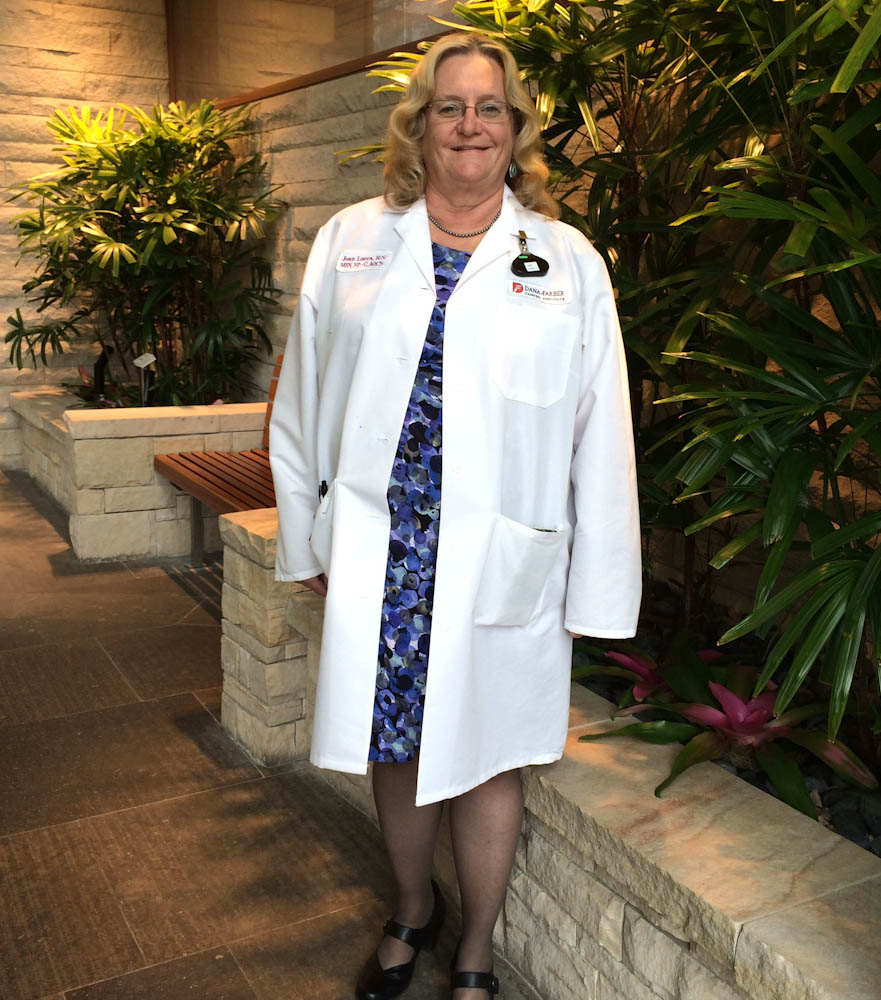This post originally appeared on HuffPost Impact.
By Joan Lucca, RN, MSN
Nearly four decades ago, I became a nurse and dedicated my life’s work to the care and comfort of patients. The ‘70s was a decade of change and opportunity as doors began to open for women in emerging science and technical fields. At the time, nursing was one of the few professions where women were welcomed and had opportunity for career advancement. My nursing career began in the emergency room but today, I am on the front lines of implementing immunotherapy, a new cancer treatment for late stage cancer that has the potential to change the way we treat the disease.

The ‘70s was also known for Nixon’s War on Cancer with the signing of the National Cancer Act. In the prior decade we had landed on the moon, could we now conquer cancer? In my patients, I saw the pain, the suffering, and urgently felt the need to do more in oncology. I joined a group of outstanding oncology nurses at Dana-Farber Cancer Institute and cared for patients who were offered the still limited treatment options to cut out, burn, or poison the cancer, with often difficult patient side effects.
In 2000, I transitioned to work as a thoracic research nurse in order to help implement new studies with new treatments and drugs that had not yet been approved by the FDA. Working with these new agents is exciting and lends hope that one day we’ll be able to cure cancer. At the same time, working on the cutting edge of the industry involves some uncertainty about side effects and outcomes. While these therapies are based in proven science, when finally bringing a treatment into clinical trials there is always something we don’t know and discover through the process. As a nurse, I assist the doctors and research teams to implement clinical trials and monitor these new treatments, while working to make sure the patients remain comfortable and safe. In this research area, we are always learning.
In a Phase 1 study of any new drug or therapy, we’re always asking, “What are the side effects, which is the safest and effective dose to give, and does it help?” It’s a learning process for everyone. Nurses are learning along with the medical staff, the sponsors of the study, and the pharmaceutical companies. There is always a side effect to these treatments, but we have to determine if the outcomes are better than the adverse effects.
Since 2012, I’ve been working with the Stand Up to Cancer-Cancer Research Institute Immunology Dream Team, a team of scientists and doctors focused on new treatments for patients with advanced melanoma. The principal investigator on the team wanted to know if a group of non-small cell lung cancer patients would benefit from participation in immunotherapy trials. They were entered into these studies and I have been working with this group of lung cancer patients. These patients are adults typically older and seniors. Most of them have stage IV lung cancer and for decades, chemotherapy was the only option available for them. Now, thanks to research coming from teams like the SU2C-CRI Immunology Dream Team, there are more options available. We have seen positive results in about one-fifth of the patients we are treating. We have one patient, an older woman, who had previously refused any chemotherapy. She has been on immunotherapy for two years and we’re happy to report that her cancer is now stable.
Read more:
Along with this good news, we have recognized some adverse effects including pneumonitis (an inflammation in the lungs that causes trouble breathing) and some other inflammatory conditions. If recognized early, these side effects can be treated. Many patients have had limited or no side effects from these immunotherapy treatments. Their tumors are shrinking and their quality of life is improving.
It’s a great feeling to see the impact this research is having on people’s lives. After decades of only getting to spend the final few months with a patients, thanks to this research, I now have patients who I have been following for several years.
And we are still figuring it all out. We don’t know how long patients will need to stay in treatment with immunotherapy. We don’t know how long patient benefits will persist after treatment is completed. We don’t know why some patients don’t respond or become resistant to treatment and what steps we should take next.
It is because of these unknowns that nurses need to keep up with the latest developments in research and seek out training. Advances in science translate into new challenges for nurses in the hospitals, particularly for therapies like immunology. In honor of National Nurses Week, Stand Up To Cancer, with support from CVS Health, announced a pilot training module to be developed by Boston College William F. Connell School of Nursing for oncology nurses working in immunotherapy. After 43 years as a nurse, I can truly say that I keep learning on the job.
I imagine many of my colleague nurses across the country are excited about the promise of new therapies like immunotherapy. But I also imagine they are as nervous as I was in the beginning. Nurses are the front line for patient care and comfort, and it’s critical we know what to expect, how to react with respect to side effects and post treatment care. Continuing education makes this transition easier for the scientific community and the people we serve.
More information about SU2C’s Continuing Nursing Education (CNE) Modules can be found here. The modules are being developed by Boston College William F. Connell School of Nursing. SU2C’s investment in patient and professional education is made possible by the donations of generous individual and corporate collaborators, including CVS Health.
